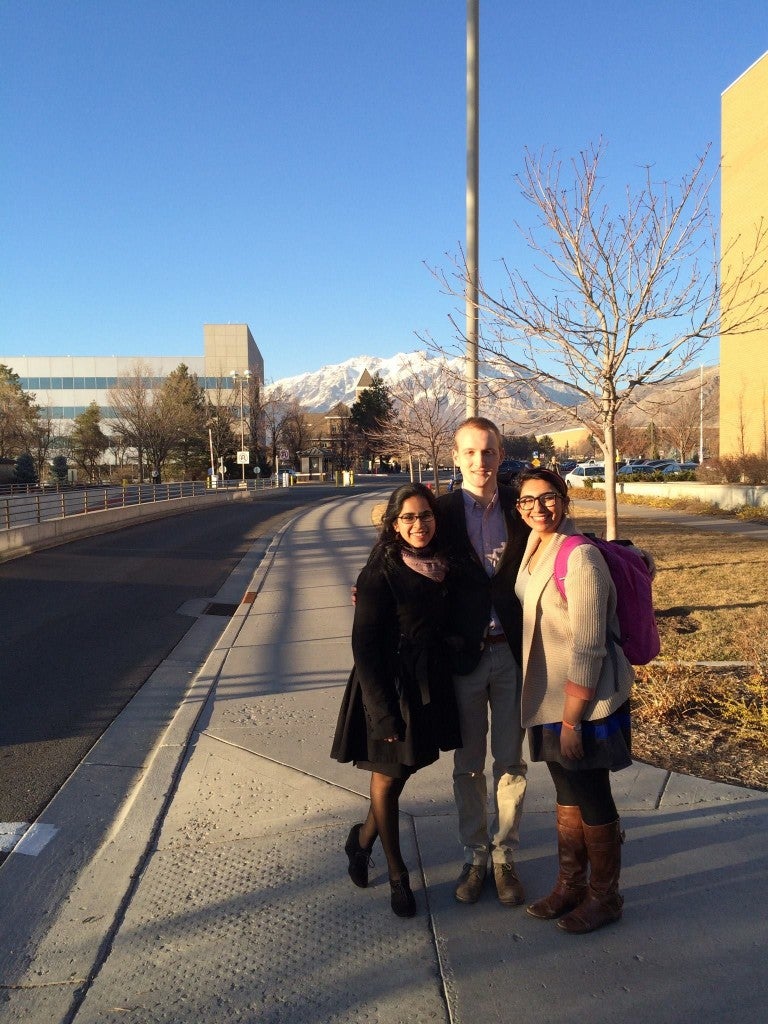Religion Is My Coffee Addiction

Noreen Sajwani (far right)
This past week, I had the privilege of attending a weeklong conference titled the Wheatley International Affairs Conference (WIAC) in Salt Lake City, Utah. Held through Brigham Young University (BYU), the hosting institution inadvertently also helped us learn about their mission, vision, and values, which are driven by the teachings of the Church of the Latter Day Saints (LDS), also known as the Mormon community. Having had a best friend in high school that was Mormon, I was both excited and nervous for the adventure ahead. Once there, I knew this experience would soon become two-fold for me; in one respect, I would learn more about the role of Islam in mitigating conflict in the Middle East (the purpose of the conference), but I also hoped to understand more about the LDS college community that I would be immersed in for the following five days. I didn’t know which one I had the upper hand in, being Muslim myself but also knowing someone that is Mormon. I knew I’d be in for surprises along the way, and I was ready to take on the challenge.
As we all settled into our retreat lodge rooms, I met a myriad of people from across the nation, many with a focus in Middle Eastern Studies or International Affairs, and others, like myself, interested in how they could apply their own area of study to this field. After a long day of traveling and some jet lag, it was time to recharge, so naturally we began to seek out the one thing college students need to stay awake: coffee. This presented a huge problem, as Mormonism prohibits the drinking of hot beverages that have caffeine in them, such as tea or coffee, and soon I could feel the withdrawal symptoms arising. As I got to know the other delegates better, we bonded by sharing our own coffee secrets and usual drink orders: one cup in the morning, skinny vanilla lattes (hold the whip), or just black with no cream or sugar. When I met my roommate Lucy, a senior at BYU, I had to ask, “How do you get through college?” Eventually, this became a hot topic during breaks among many BYU students and incoming delegates.
One night, while discussing the technicalities of this rule with Lucy, she finally explained the concept to me in a way that I could understand. “Back in the time of the Jewish revelation, the mixing of meat and dairy was prohibited because God wanted us to be well and healthy, as sanitation may have been of concern. Later, with Islam, pork was prohibited by God for similar reasons, and I think the way I’ve justified it to myself is that in today’s day and age, God wants to protect us from the current day addictions that strain us from excelling, like coffee. Its addiction can hurt us, so we abide by abstaining.” It finally clicked, and although I myself may have difficulty adhering to this practice, I could relate and had a lot of respect for her and other students that did. Similar to the way I don’t consume alcohol, she felt she had been given the advice from God as a form of protecting her. Free will allowed her to do whatever she pleased in reality, but her spiritual interpretation of the rule brought her to a closer relationship with God, as she explained it.
Lucy then proceeded to ask me how I felt about the issue of women’s rights in Islam, particularly with concepts like veiling or current event issues like Malala Yousafzai. I shared with her an article I recently came across titled “Practicing Islam in Short Shorts,” which helped explain intra-faith struggles I often encounter with my faith. Even though terrorism, equality, and strict adherence are all parts of my religion that I question, these are the questions I think about on a day-to-day basis. They may be subtle, but they are often times more important to me as a believer than the societal perceptions of Islam portrayed in the media. When I told Lucy this, she felt similarly, as the role of polygamy in Mormonism is often criticized as a lack of women’s rights and equality in the faith tradition. We found commonalities in our struggle within our own faiths, and in this way, became closer to the values that brought us together for that week.
Throughout the conference, our primary objective was to create a policy recommendation for a certain issue of our choosing. My group, focusing on anti-ISIS recruitment efforts in the US, discerned ways to build bridges within the community by analyzing the role of Islam in speaking out against extremist messages and showcasing moderate Muslim voices as an intermediary tool. The entire week was fascinating, and I learned more about Islam in the Middle East from my peers than I had ever known about that region before. But all the policies, strategies, and stakeholders wouldn’t have meant anything if I hadn’t committed to learning about Lucy as a person of faith, as someone who loves her religion and prides herself on how it informs her values and beliefs of society at large. My group termed this exchange social investment, a concept we researched that utilized building personal relationships to promote collaboration. I called it the power of religion, realizing once again the role of interfaith dialogue in my everyday life. As the saying goes, “You can’t live with it, you can’t live without it.” And just like my daily morning coffee, the opportunities to have these very conversations are one of those things I’m glad I can’t live without.
Noreen Sajwani, NHS ’15
- Tagged
- Interfaith